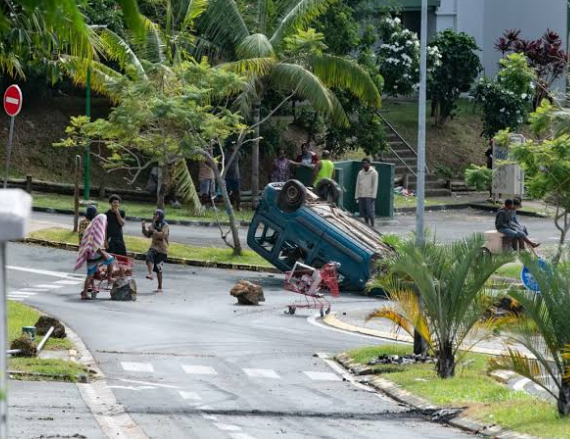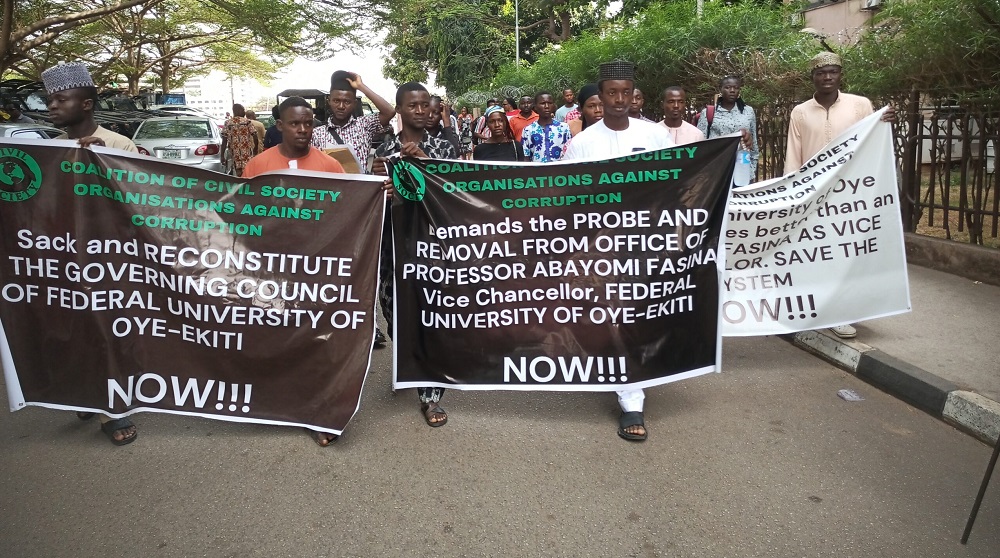News
France Bans TikTok In Riot-Hit New Caledonia

By Kayode Sanni-Arewa
France deployed troops to New Caledonia’s ports and international airport, banned TikTok and imposed a state of emergency Thursday after three nights of clashes that have left four dead and hundreds wounded.
The emergency measures give authorities greater powers to tackle the unrest that has gripped New Caledonia since Monday, when protests over voting changes pushed by Paris turned violent.
Additional powers under the state of emergency include the possibility of house detention for people deemed a threat to public order and the ability to conduct searches, seize weapons and restrict movements, with possible jail time for violators.
The last time France imposed such measures on one of its overseas territories was in 1985, also in New Caledonia, the interior ministry said.
“No violence will be tolerated,” said Prime Minister Gabriel Attal, adding that the state of emergency “will allow us to roll out massive means to restore order”.
Attal told a crisis ministerial meeting that troops had been deployed to secure ports and the international airport and the government representative in New Caledonia has “banned TikTok”.
The airport is already closed to international flights.
The state of emergency was announced hours after a French gendarme who was seriously injured during riots in New Caledonia died of his wounds, said Interior Minister Gérald Darmanin, raising the death toll to four.
The death of the French gendarme followed two nights of rioting as protesters demonstrated against a constitutional reform being debated in the national assembly in Paris that aims to expand the electorate in the territory’s provincial elections.
Vehicles torched, shops looted
The unrest flared after French lawmakers approved a bill extending voting rights in provincial elections to residents arriving from mainland France – a change critics fear could marginalise Indigenous people and benefit pro-France politicians.
Following lengthy and at times tense debates, the National Assembly in Paris adopted the reform shortly after midnight, by 351 votes to 153.
Macron cancelled a planned visit to Normandy to chair cabinet-level national security talks on the crisis Wednesday morning, his office said.
Protests turned violent Monday night, with shots fired at security forces, vehicles torched and shops looted in the worst unrest the French overseas territory has seen since the 1980s.
In response, authorities deployed a heavy security contingent, imposed a curfew, banned public gatherings and closed the main airport.
French authorities in the territory said that more than 130 people have been arrested and more than 300 have been injured since Monday in the violence.
“More than 130 arrests have been made and several dozen rioters have been taken into custody and will be brought before the courts,” the French High Commission of the Republic in New Caledonia said in a statement early Wednesday morning.
Describing the “serious public disturbances” as ongoing, the High Commission decried widespread looting and torching of businesses and public property, including schools.
It added that classes will remain scrapped until further notice and the main airport shut to commercial flights.
Dispute over voting rights
Macron has been seeking to reassert his country’s importance in the Pacific region, where China and the United States are vying for influence but France has a strategic footprint through its overseas territories, which include New Caledonia and French Polynesia.
Lying between Australia and Fiji, New Caledonia is one of several French territories spanning the globe from the Caribbean and Indian Ocean to the Pacific that remain part of France in the post-colonial era.
In the Noumea Accord of 1998, France vowed to gradually give more political power to the Pacific island territory of nearly 300,000 people.
Under the agreement, New Caledonia has held three referendums over its ties with France, all rejecting independence. But independence retains support, particularly among the Indigenous Kanak people.
The Noumea Accord has also meant that New Caledonia’s voter lists have not been updated since 1998 – meaning that island residents who arrived from mainland France or elsewhere in the past 25 years do not have the right to take part in provincial polls.
The French government has branded the exclusion of one out of five people from voting as “absurd” while separatists fear that expanding voter lists would benefit pro-France politicians and reduce the weight of the Kanaks.
‘Determination of our young’
Simmering protests over the planned changes to voter eligibility took a violent turn on Monday night, with groups of young masked or hooded demonstrators taking over several roundabouts and confronting police, who responded with non-lethal rounds.
One business group said around 30 shops, factories and other sites in and around the capital Noumea had been set ablaze, while an AFP journalist saw burned-out cars and the smoking remains of tyres and wooden pallets littering the streets.
Firefighters said they had received around 1,500 calls overnight and responded to 200 blazes.
Even after the curfew was put in place on Tuesday, there were acts of vandalism overnight, with the store of a major sports brand ransacked.
A prison rebellion involving some 50 detainees in the Camop-Est facility subsided after security forces regained control, local officials said.
Pro-independence party leader Daniel Goa asked the youths to “go home”, and condemned the looting.
But he added: “The unrest of the last 24 hours reveals the determination of our young people to no longer let France take control of them.”
The main figure of the non-independence camp, former minister Sonia Backes, denounced what she described as the anti-White racism of demonstrators who burned down the house of her father, a man in his 70s who was exfiltrated by the security forces.
“If he was not attacked because he was my father, he was at least attacked because he was White,” she told BFMTV.


News
SAD! Woman Reportedly Poisons Boyfriend To D3ath For Cheating On Her

…conceals Body Under Bed
A young woman allegedly poisoned her boyfriend to d3ath for cheating on her in Iyo Polo community, Marine Base, Port Harcourt, Rivers State.
It was gathered that after k!lling the deceased, she hid his body under the bed inside his room for three days.
According to local reports, residents of the area became suspicious after noticing a foul odor emanating from the victim’s residence.
Concerned neighbors attempted to reach the deceased but received no response.
Their suspicions grew when they observed the suspect acting strangely and refusing entry into the apartment.
Upon notifying law enforcement, officers arrived at the scene and forced their way into the room, where they discovered the decomposing body of the victim.
The suspect was immediately arrested and taken into police custody for further investigation.
Authorities have yet to release an official statement regarding the motive behind the alleged m8rder.
However, preliminary findings suggest that the incident may have stemmed from a domestic dispute.
News
Protesters call for suspension of FUOYE VC over alleged sexual harassment

A group of protesters have converged on the Federal Ministry of Education in Abuja, calling for the suspension of Professor Abayomi Fasina as Vice-Chancellor of the Federal University, Oye-Ekiti (FUOYE), to allow proper investigation into sexual harassment allegation.
Protesters armed with placards-bearing slogans such as ‘Ekiti Deserves Better’ and ‘Protect Our Women,’ argued that the Vice-Chancellor cannot remain in office while facing investigation for sexual harassment allegations.
The embattled VC has been under investigations over allegations made in a leaked voice note regarding a sexual harassment case against one of his married subordinates.
Speaking to journalists after submitting a petition to the Minister of Education, Tunji Alausa, the leader of the protesters under the aegis of Coalition of Civil Society Organisations Against Corruption, Victor Adetola, said suspending the VC would give room for thorough investigations into the matter.
Adetola said: “We have looked at the developing story that has been going on in that university as an organisation that is fronting for the welfare of Nigerian students and the community or the educational community generally.
“The issue will be festering if there is no thorough investigation, and we need that place to be sanitised. Honestly, currently there is a disciplinary action investigation that is going on that was first given a three-week ultimatum.
“After that, they requested for another three weeks ultimatum, even inclusive of the governing council. And for the past six months, nothing has been done. We see that a lot of undiagnosed, a lot of corruption has been festering.
“In fact, one of the most critical issues happening is the sexual harassment that has happened to one of the married assistant directors in that school.
“Specifically, it’s necessary that the leader of the university steps down first, or the governing council relieves him of that position first, so that independent investigation can be carried out on all the petitions that we have written.”
News
NJC, NBA raises concerns as Uzodimma names Nzeukwu Imo’s acting Chief Judge

The National Judicial Council (NJC) has distanced itself from the purported appointment by Governor Hope Uzodinma of Justice Theophilus Nnamdi Nzeukwu as the acting Chief Judge of Imo State.
The NJC, in a statement by its Deputy Director (Information), Mrs. Kemi Ogendengbe said it was yet to consider a request by Uzodinma to appoint Justice Nzeukwu, who is currently number four in the hierarchy of judges’ seniority in Imo State High Court.
The statement reads: “The attention of the council has been drawn to the news making rounds that the Governor of Imo State, His Excellency, Senator Hope Uzodimma, CON, had purportedly appointed Hon. Justice Theophilus Nnamdi Nzeukwu, who is number four in the hierarchy of judges seniority in Imo State High Court, as the acting Chief Judge of the state, in view of the recent disciplinary action taken against the erstwhile Chief Judge of the state.
“The National Judicial Council, by this press release, wants to clarify to the public that the Governor of Imo State had earlier written to the council requesting for its approval to appoint Hon. Justice Theophilus Nnamdi Nzeukwu, who is number four in the hierarchy of seniority as acting Chief Judge of the state.
“The governor in his said correspondence to the council, gave reasons why in his own view, the three most senior judges are not appointable.
“The council is informing the public that the said letter is yet to be considered, as deliberation on the request is slated for the next council meeting, which is scheduled to hold on 29th and 30th April, 2025.
“The council is therefore, by this press release, informing the public that the governor’s request is yet to be considered by the council.
“The council has not given approval to the governor for the appointment of the acting Chief Judge.
“The council is not a party to the process of the purported appointment of Hon. Justice Theophilus Nnamdi Nzeukwu as the acting Chief Judge.”
The NJC had, at its 107th meeting held between November 13 and 14, 2024 recommended the compulsory retirement of the then Chief Judge of Imo State, Justice T. E. Chukwuemeka Chikeka over alleged age falsification.
It said Justice Chikeka was recommended to the Imo State Governor for compulsory retirement with effect from October 27, 2021, with all salaries and allowances the judge received in excess from the said date refunded to the council.
The NJC added: “The recommendation was pursuant to the findings of the Council that His Lordship has two different dates of birth: 27 October 1956 and 27 October 1958.
“However, 27 October 1956 appeared to be the consistent date of birth, but in 2006, the Chief Judge swore to an affidavit changing the date of birth to 27 October 1958.”
Meanwhile, the Nigerian Bar Association (NBA) Owerri Branch has expressed serious concerns over the appointment.
Speaking after swearing in the new Acting Chief Judge, Governor Uzodimma recalled the disgraceful manner the former Chief Judge was removed from office by the NJC, and the events that followed thereafter, and warned against a repeat of what he described as “dishonourable incident where a Chief Judge is suddenly removed from office for such an ugly indictment of age falsification.”
Reacting to the appointment, the NBA urged Governor Uzodimma to adhere to due process in the appointment of a new Chief Judge, emphasising the importance of following established protocols to ensure transparency and legitimacy.
According to the NBA, Nzeukwu’s appointment violates the provisions of the 1999 Constitution, which stipulates that the most senior judge of the High Court should be appointed as Acting Chief Judge in the event of a vacancy.
“We insist that due process must be followed in the appointment of the Acting Chief Judge,” Chairman of the NBA Owerri Branch, Chief Chris U. Ihentuge and the Secretary, Daniel O. Odiba, said in a statement yesterday.
According to the statement: “If the most senior judge or judges were bypassed, the rationale for this deviation must be immediately justified.”
Failure to do so, they warned, will further erode public confidence in the judiciary.
The NBA demands that Governor Uzodimma takes immediate action to address this situation and reverse the appointment, which they deem inconsistent with the Constitution.
The statement reads in part: “The Nigerian Bar Association, Owerri Branch demands that the Governor should, immediately, take steps to address this situation and reverse this action which is inconsistent with the Constitution. Failure to do so will further erode public confidence in the judiciary at a time when trust in our institutions is already fragile. The Bar shall also take all steps necessary in the circumstance.
“The Nigerian Bar Association, Owerri Branch, reiterates that it has no interest in any particular individual holding the office of the Chief Judge, but it is deeply committed to the protection of due process, the rule of law, and the sanctity of the Constitution.
“The NBA Owerri Branch has communicated its concerns to the Imo State Attorney General and Commissioner for Justice, the Body of Senior Advocates of Nigeria (BOSAN), Imo State Chapter, the Judicial Service Commission (JSC) of Imo State, the President of the Nigerian Bar Association, and the National Judicial Council (NJC).”
-

 News24 hours ago
News24 hours agoJust in: Gunmen Hijack Loaded Bus,K!!ll Driver, Abduct Passengers
-

 News17 hours ago
News17 hours agoJUST-IN: Burkina Faso President Traore Reportedy Survives Another Assassination Attempt
-

 News8 hours ago
News8 hours agoFull list: NNPC appoints new senior management team
-

 News20 hours ago
News20 hours agoDamaged reputation: Akpabio drags Abbo, Natasha to court
-

 News8 hours ago
News8 hours agoSAD! APC publicity scribe dies in UK
-

 News22 hours ago
News22 hours agoFamous Indian movie star, Manoj Kumar is dead
-

 News18 hours ago
News18 hours agoUS Keenly Monitoring Edo Election Appeal Process Amid Concerns Over Transparency
-

 News9 hours ago
News9 hours agoInmate allegedly killed wife during prison visit




